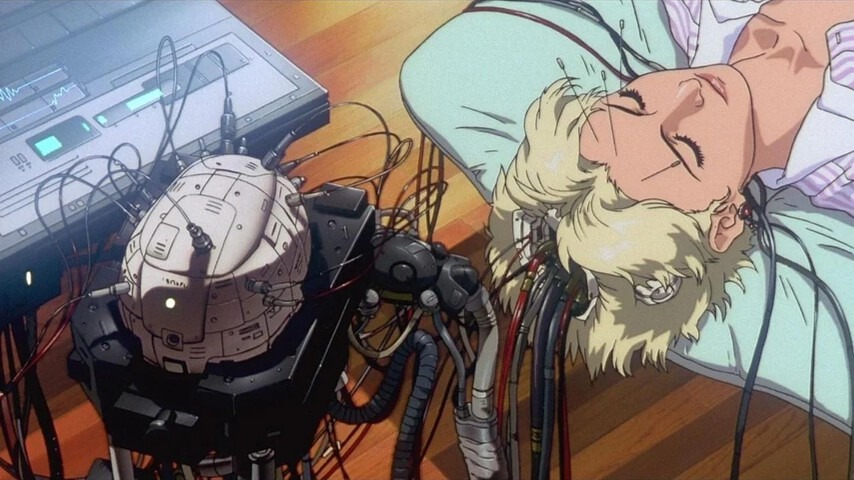Carbon-based humans are more "useful" than silicon-based robots as a war force or operational tool.
In the current rapid development of humanoid robots, this statement might seem counterintuitive. However, if we could use technology to transfer accumulated wisdom and experience from one individual to another carbon-based body, the situation might change. This concept is not only the core setting of the recently adapted sci-fi novel "Old Man’s War" but also resonates with a lecture by Nobel Prize in Physics winner Geoffrey Hinton on AI development—suggesting that the natural computational potential of the human brain might be more competitive than pure silicon-based systems.
"Old Man’s War" is a military science fiction novel by John Scalzi, published in 2005, depicting 22nd-century interstellar warfare: Earth has become a frontier of civilization, and humans clash with alien forces to compete for habitable planets. The Colonial Defense Forces recruit not young soldiers but seniors over 75—through consciousness transfer technology, their wisdom and experience are transferred to genetically edited, brain-computer interface enhanced "new bodies," becoming carbon-based combat power adapted to battlefield needs. According to foreign media reports, Steven Spielberg, known for his love of sci-fi themes with films like "Ready Player One" and "A.I. Artificial Intelligence," has confirmed the adaptation of this novel.

Old Man’s War has connections to the AI godfather. (Source: Goodreads, Britannica)
In the future of "Old Man’s War," the body is no longer important because it can be replaced or even enhanced through technology (similar to cyberpunk's replicants and body enhancements), what capital or the military values is the "knowledge and experience" accumulated over time. Coincidentally, a lecture by Hinton released earlier this month highlighted that "AI already possesses subjective experience," involving the human brain as a form of "mortal computation," and "subjective experience/consciousness" is essentially our interpretation of the observed world, seemingly pointing to the technical and theoretical possibilities in "Old Man’s War."
How does "Old Man’s War" depict the transfer of consciousness?
Sounds mind-blowing, right? Let’s take a look at how "Old Man’s War" describes the protagonist being coaxed into consciousness transfer. First, you need to prepare an advanced clone (a better version of yourself, reminiscent of "Altered Carbon"):
"A clone," I finally said.
"No," Dr. Russell said, "not exactly, the DNA has been significantly modified, you can see the most obvious difference on the skin."
I turned to look at the younger version, feeling shocked that I hadn’t noticed such a huge and obvious difference.
"He’s green," I said.
"What you mean is, you are green, five minutes from now,"
Russell said, "The second question of 'how' is, how do we get you into that shell?" He pointed to my green-skinned brother, "The answer is, we’re going to perform a consciousness transfer on you."
"How?" I asked.
Ultimately, the protagonist is transferred into a green clone optimized with chlorophyll for "optimal oxygen and carbon dioxide usage," and the novel humorously nods to traditional theology with a troubleshooting guide in the protagonist’s new body manual: "I’m worried about the theological implications of my new body, what should I do?"

Cyberpunk work "Altered Carbon" also involves consciousness transfer to new bodies, but unlike "Old Man’s War," it doesn’t just transfer to a clone of oneself. (Source: Netflix)
Hinton: The human brain is a highly efficient "mortal computation"
So how does Hinton’s perspective point to the possibilities in sci-fi novels?
Hinton first distinguishes the differences in knowledge across different modes/carriers (i.e., computers and human brains): Digitized knowledge in computers is immortal computation—since the same system can be installed on different hardware, as long as you remember to back it up. However, Hinton also points out that digital processing of knowledge is very inefficient, as large language models can consume the electricity of an entire city. In contrast, the human brain only requires about 30 watts, making it much more efficient. Hinton refers to the computation using human brain neurons as "mortal computation"—because, unlike digital storage, knowledge fades as the physical body decays.
But in the "Old Man’s War" excerpt above, when the body becomes a consumable like computer hardware, the human brain processing and carrying knowledge, to some extent, becomes immortal computation—and it’s more cost-effective. Hinton also mentioned that in current AI training, when the scale becomes too large, backpropagation becomes cumbersome and energy-consuming. It’s like building a skyscraper but having to check every pillar, beam, and brick from the top floor down to find out which structures are problematic, and this process has to be repeated millions of times. Therefore, Hinton considers the possibilities of different media/carriers processing knowledge.
Consciousness is how we interpret received information
Besides the human brain as "mortal computation," Hinton also discussed that AI already possesses "subjective experience/consciousness." Previously, another expert, Nick Bostrom, published on a similar topic, pointing out that AI can perceive and understand environmental information, and Bill Gates has said that AI’s next breakthrough is in "metacognition"—the ability for self-reflection. However, Nick Bostrom did not precisely define "subjective experience/consciousness," and Hinton’s perspective might stimulate more thoughts on consciousness transfer in novels.
Hinton believes that consciousness is actually our way of understanding the world, a mechanism for interpreting the information received by our perception system. For example, when we say "I see a pink elephant floating," we’re not describing a "theater" in our brain but explaining "if there really were a pink elephant floating, then what I’m seeing now would make sense." In other words, the focus of consciousness is not on judging whether what we see truly exists, but on how we understand and interpret the sensory information we receive.
From this perspective, consciousness transfer in "Old Man’s War" has more dimensions: it’s not simply "brain data relocation" (making knowledge immortal) but also retains the original way of interpreting the world (the wisdom and experience of the elderly). When experienced veterans receive new bodies, they can use their accumulated wisdom to face wars, whether the enemy is aliens, giant insects, or a young human who might have an old soul like them.
Combining Hinton’s insights, the setting of "Old Man’s War" indeed makes sense: carbon-based humans are not only cheaper and more efficient in processing knowledge, but most importantly, they can retain the wisdom and experience honed over time—like having an elder at home is like having a treasure.
Although Hinton’s lecture provides a theoretical basis for the novel’s setting, there is still a long way to go on the technical side: How is consciousness transferred? What ethical issues will arise from cloning humans? Perhaps we won’t see the "mortal computation" of the human brain become true "immortal computation" in our lifetime, but Hinton’s thoughts on the nature of consciousness once again bridge the interaction between philosophy and science, sparking a question worth pondering repeatedly—Is the new "me" still "me"? At least, when Steven Spielberg’s "Old Man’s War" hits theaters, we can bring this new thought and perspective with us.

Hinton’s lecture covers many aspects, and the point that AI already has subjective experience is thought-provoking, highly recommended. (Source: YouTube)






